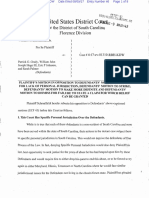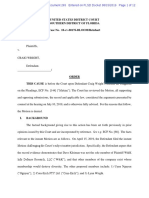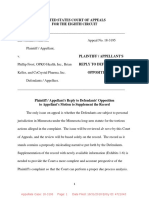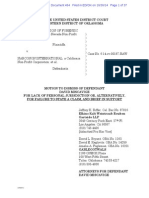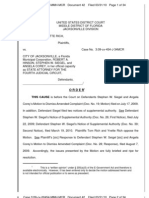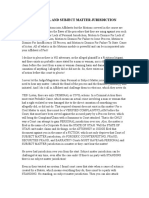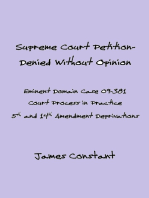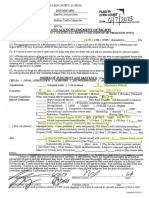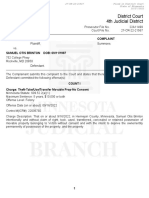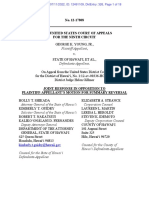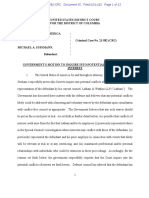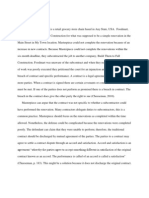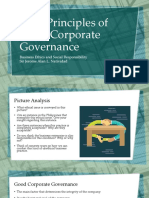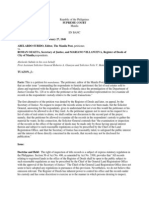Ecf 89
Uploaded by
himself2462Ecf 89
Uploaded by
himself2462IN THE UNITED STATES DISTRICT COURT
FOR THE WESTERN DISTRICT OF VIRGINIA
CHARLOTTESVILLE DIVISION
__________________________________________
)
BRENNAN M. GILMORE, ) Case No. 3:18-cv-00017-NKM
)
Plaintiff, )
) DEFENDANT ALLEN B. WEST’S
vs. ) REPLY IN SUPPORT
) OF MOTION TO DISMISS
)
ALEXANDER (“ALEX”) E. JONES, et al., )
)
Defendants. )
)
Lt. Col. Allen B. West, one of the defendants named in this case, hereby respectfully
submits this reply in support of his previously-filed motion to dismiss and reiterates that, for the
reasons previously stated as well as those articulated below, dismissal of all claims against him is
appropriate under Rules 12(b)(1), (b)(2), and (b)(6) of the Federal Rules of Civil Procedure.
I. PLAINTIFF HAS NOT CONTROVERTED THE FACTS PRESENTED BY LT.
COL. WEST THAT DEMONSTRATE A LACK OF PERSONAL
JURISDICTION, AND THE COMPLAINT’S ALLEGATIONS DO NOT
ESTABLISH JURISDICTION IN VIRGINIA OVER LT. COL. WEST.
Despite Lt. Col. West offering verified evidence and thereby presenting a factual challenge
to the exercise of personal jurisdiction by this Court, plaintiff has failed to offer any verified
evidence of his own that contradicts Lt. Col. West’s declaration. Indeed, plaintiff’s response does
not even cite Rule 12(b)(2) or the standard applicable to such motions challenging the exercise of
personal jurisdiction over a defendant. The amici supporting plaintiff likewise do not address the
facts contained in Lt. Col. West’s declaration.
At all times relevant to this case, Lt. Col. West has been a resident and domiciliary of the
State of Texas, and he has no place of business in the Commonwealth of Virginia. (D.E. #59-1:
Case 3:18-cv-00017-NKM-JCH Document 89 Filed 07/10/18 Page 1 of 12 Pageid#: 1445
West Decl. ¶¶ 3-5.) Plaintiff does not controvert any of these allegations in discussing the question
of jurisdiction over Lt. Col. West. Moreover, the evidence from Lt. Col. West establishes that he
had no ownership interest in, or involvement with, the website that published the allegedly
defamatory statements, nor was he involved with the subject article’s writing or publication. (Id.
¶¶ 6-8.) Once again, plaintiff has submitted no proof that contradicts this verified evidence from
Lt. Col. West.
A plaintiff bears the burden of establishing personal jurisdiction by a preponderance of the
evidence. Mylan Lab., Inc. v. Akzo, N.V., 2 F.3d 56, 59-60 (4th Cir. 1993). Here, with Lt. Col.
West having submitted evidence denying jurisdiction, the burden shifts to plaintiff to come
forward with evidence, not mere allegations, to sustain the exercise of jurisdiction by this Court.
See, e.g., Pan-American Prods. & Holdings, LLC v. R.T.G. Furniture Corp., 825 F. Supp. 2d 664,
676 (M.D.N.C. 2011) (“[W]here the defendant provides evidence that denies the facts essential for
jurisdiction, the plaintiff must present sufficient evidence to create a factual dispute on each
jurisdictional element which has been denied by the defendant and on which the defendant
presented evidence.”)); see also Posner v. Essex Ins. Co., 178 F.3d 1209, 1214 (11th Cir. 1999);
Brown & Brown, Inc. v. Cola, 745 F. Supp. 2d 588, 602 (E.D. Pa. 2010) (noting that after the
burden shifts the “[p]laintiff may . . . through affidavits or competent evidence that show sufficient
contacts with the forum state to establish personal jurisdiction”) (citation omitted); Clark v. Meijer,
Inc., 376 F. Supp. 2d 1077, 1082 (D.N.M. 2004) (“When . . . a defendant presents credible evidence
through affidavits or other materials suggesting the lack of personal jurisdiction, the plaintiff must
come forward with sufficient evidence to create a genuine dispute of material fact on the issue.”)
(citing Doe v. National Medical Services, 974 F.2d 143, 145 (10th Cir. 1992)). Plaintiff, however,
Case 3:18-cv-00017-NKM-JCH Document 89 Filed 07/10/18 Page 2 of 12 Pageid#: 1446
has not undertaken any such effort, and has presented no verified proof to this Court to support
personal jurisdiction over Lt. Col. West in the Commonwealth of Virginia.
The most that plaintiff has done is, in the part of his brief addressing dismissal under Rule
12(b)(6), cite to his own counsel’s letter, which discusses certain features of AllenBWest.com, the
website on which the allegedly defamatory article being attributed to Lt. Col. West was posted.
(See Pl.’s Response at 34 n.15 (discussing Exs. I & J thereto).) The items alleged by plaintiff’s
counsel about the website, though, do not contradict Lt. Col. West’s declaration, which clearly
states that he did not own the website and did not have any involvement with it or the article at
issue. 1 Plaintiff’s speculation and innuendo cannot defeat actual evidence. Accordingly, there is
no basis for exercising personal jurisdiction over Lt. Col. West.
Additionally, plaintiff’s argument for exercising personal jurisdiction over Lt. Col. West
in Virginia is foreclosed by Supreme Court and Fourth Circuit precedent. “[T]o justify the exercise
of personal jurisdiction over a non-resident defendant, the defendant’s contacts with the forum
state must have been so substantial that ‘they amount to a surrogate presence and thus render the
sovereignty just.’” Consulting Eng’rs Corp. v. Geometric Ltd., 561 F.3d 273, 277-78 (4th Cir.
2009) (quoting ESAB Group, Inc. v. Centricut, Inc., 126 F.3d 617, 623 (4th Cir. 1997)). Thus, for
jurisdiction to comport with the requirements of due process, a plaintiff must “show that the
defendant ‘purposefully directed his activities at the residents of the forum’ and that the plaintiff’s
cause of action ‘arise[s] out of’ those activities” lest the defendant be “‘haled into a jurisdiction
1
The AllenBWest.com screenshots excerpted by plaintiff in his counsel’s letter do not show any
representation that the site is owned or operated by Lt. Col. West. Similarly, no part of the “contact
page” states that it is providing a direct means to communicate with Lt. Col. West, and the part
that mentions “speaking engagements” actually directs the reader to contact a speaker’s bureau
(Worldwide Speaker’s Group). (See D.E. #70-10: Ex. I at CM/ECF p 4.)
3
Case 3:18-cv-00017-NKM-JCH Document 89 Filed 07/10/18 Page 3 of 12 Pageid#: 1447
solely as a result of random, fortuitous, or attenuated contacts.’” Id. at 277 (quoting Burger King
Corp. v. Rudzewicz, 471 U.S. 462, 472 (1985) (citation and quotation omitted)).
The Fourth Circuit’s decision in Young v. New Haven Advocate, 315 F.3d 256 (4th Cir.
2002), represents an application of this rule that controls the instant case. In Young, the Fourth
Circuit held that the Virginia plaintiff (a prison warden) could not sue two out-of-state newspapers
and their editors and reporters in Virginia due to a lack of personal jurisdiction. Id. at 262-63. As
the court explained, when an article is placed on the internet, the out-of-state publisher must
“manifest an intent to target and focus on . . . readers” in the state where personal jurisdiction is to
be exercised before such jurisdiction will be proper. Id. at 263. The Fourth Circuit held that
Virginia lacked jurisdiction—even though the articles at issue in that case discussed the plaintiff’s
alleged conduct in Virginia. See id. at 259 (defendants’ articles discussed “allegedly harsh
conditions at the Virginia prison”).
Ultimately, neither plaintiff’s amended complaint nor any evidence submitted to this Court
demonstrates that either the article being attributed to Lt. Col. West or the website itself
“manifest[ed] an intent to target and focus on . . . readers” in Virginia, as required by the Fourth
Circuit in Young. See id. at 263. Plaintiff attempts to distinguish Young by arguing that Virginia
was the “focal point” of the articles at issue. But, Virginia is no more the focal point here than it
was in Young. Indeed, there is no disputing that the events in Charlottesville constituted a
nationwide story and that plaintiff himself helped make it a national and even international story
when he posted his video on Twitter. (See Pl.’s Am. Compl. ¶¶ 31-35.)
Moreover, the plaintiff in Young made effectively the same argument as plaintiff here by
arguing that personal jurisdiction existed in Virginia because “the newspapers posted articles on
their Internet websites that discussed the warden and his Virginia prison, and he would feel the
Case 3:18-cv-00017-NKM-JCH Document 89 Filed 07/10/18 Page 4 of 12 Pageid#: 1448
effects of any libel in Virginia, where he lives and works.” Id. at 262. The Fourth Circuit, however,
rejected the contention that this was a sufficient basis for personal jurisdiction.
Plaintiff makes one last effort to salvage personal jurisdiction by arguing that it would
simply be unfair to require him to sue Lt. Col. West (and the other defendants) in other states. (See
Pl.’s Resp. at 20.) Plaintiff cites no authority for the proposition that this is the relevant standard.
To the contrary, there is no constitutional right to sue a defendant in one’s own home state, but
there is a well-established due process right for a defendant to be free from suit in a state unless
that defendant has “‘certain minimum contacts with it such that the maintenance of the suit does
not offend traditional notions of fair play and substantial justice.’” ALS Scan, Inc. v. Digital Serv.
Consultants, Inc., 293 F.3d 707, 710-11 (4th Cir. 2002) (quoting Int’l Shoe Co. v. Washington, 326
U.S. 310, 316 (1945) (internal quotation marks and citation omitted)).
Therefore, because the proof before the Court shows that Lt. Col. West has no relevant
connection with the Commonwealth of Virginia or with the allegedly defamatory article at issue,
he is not subject to personal jurisdiction in this Court. Furthermore, plaintiff’s own allegations are
insufficient to establish personal jurisdiction because they fail to evidence an intent by Lt. Col.
West “to target and focus on . . . readers” in Virginia. Young, 315 F.3d at 263. Thus, Lt. Col.
West’s Rule 12(b)(2) motion to dismiss for lack of personal jurisdiction should be granted.
II. TEXAS LAW APPLIES TO THE CLAIMS AGAINST LT. COL. WEST.
Additionally, plaintiff’s response erroneously contends that Virginia, rather than Texas,
law applies to this case. The allegation as to Lt. Col. West is that he published a defamatory
statement. In tort actions, Virginia applies the lex loci delicti—the law of the “‘place of the wrong’
. . . [that is] the place ‘the last event necessary to make an [actor] liable for an alleged tort takes
place.’” Ford Motor Co. v. Nat’l Indem. Co., 972 F. Supp. 2d 850, 856 (E.D. Va. 2013) (citations
Case 3:18-cv-00017-NKM-JCH Document 89 Filed 07/10/18 Page 5 of 12 Pageid#: 1449
omitted). There is no allegation that Lt. Col. West, a citizen and resident of Texas, has been present
in any state other than Texas at any time relevant to this action, and more importantly there is no
allegation that Lt. Col. West has ever engaged in any conduct within Virginia. Thus, the “last
event” for his alleged actions in publication of a supposedly defamatory statement would have
necessarily occurred in Texas, not Virginia. Plaintiff cites the Fourth Circuit case of Wells v.
Liddy, 186 F.3d 505 (4th Cir. 1999), but in that case the court was applying Maryland, rather than
Virginia, choice of law principles. Unlike the Maryland, Virginia has not signaled that it would
depart from the traditional lex loci delicti rule to the more liberal standard of the Second
Restatement of Conflict of Laws. See 186 F.3d at 528. Therefore, applying Virginia’s choice of
law rules would result in application of Texas law to the allegations made against Lt. Col. West.
III. PLAINTIFF HAS FAILED TO ALLEGE A PLAUSIBLE CLAIM FOR
DEFAMATION BY LT. COL. WEST.
A. Plaintiff Has Failed To Plausibly Allege That Lt. Col. West Had Any Role In
The Publication Of The Statement At Issue, And As A Matter Of Law The
Statement Attributed To Lt. Col. West Was Not Defamatory.
First, plaintiff has failed to make a plausible allegation that Lt. Col. West had any particular
role in the article with which he takes issue. Plaintiff’s amended complaint, for instance, does not
allege that Lt. Col. West wrote or edited the article. Instead, plaintiff asserts simply that the author
of the article was his agent or employee and that he owned the website on which it was published
as well as the Twitter account from which it was republished. The amended complaint, though,
includes no detailed factual allegations to substantiate these assertions and even elsewhere asserts
that Word-N-Ideas, LLC, is the “purported owner” of the subject website. (See Pl.’s Am. Compl.
¶¶ 24; 278-79.) This lack of detail to substantiate any involvement or establish any other basis for
liability fails to satisfy the Twombly-Iqbal pleading standard. See Ashcroft v. Iqbal, 556 U.S. 678-
79 (2009) (“Threadbare recitals of the elements of a cause of action, supported by mere conclusory
Case 3:18-cv-00017-NKM-JCH Document 89 Filed 07/10/18 Page 6 of 12 Pageid#: 1450
statements, do not suffice.”); see also Coleman v. Maryland Court of Appeals, 626 F.3d 187, 190
(4th Cir. 2010).
Further, even taking as true the allegations of plaintiff’s amended complaint for purposes
of Rule 12(b)(6), plaintiff still fails to establish a plausible claim for defamation against Lt. Col.
West. For a claim of defamation to lie under either Texas or Virginia law, the defendant must
have made an assertion of fact that is false. See Neely v. Wilson, 418 S.W.3d 52, 63-64 (Tex.
2013); Jordan v. Kollman, 269 Va. 569, 575, 612 S.E.2d 203 (2005) (“True statements do not
support a cause of action for defamation.”). Plaintiff’s own response brief concedes, however, that
the article attributed to Lt. Col. West was quoting another article and included language indicating
that the information being reported had not been verified. (See Pl.’s Resp. at 34-35.) Oddly,
plaintiff then says that “the interference fairly attributable to the words in this article is that the
author has evidence that [plaintiff]” was involved in a massive conspiracy. (Id. at 35-36.) The
very meaning of the words used, though, is quite the opposite—the article says the information
being reported by someone else constituted “‘early accounts and [were] as yet unverified.’” (Id.
at 35 (quoting article attributed to Lt. Col. West).)
For these same reasons, there can be no contention that the article attributed to Lt. Col.
West is defamatory per se. See Hancock v. Variyam, 400 S.W.3d 59, 63-64 (Tex. 2013).
(“[D]efamation per se has involved statements that are so obviously hurtful to a plaintiff’s
reputation that the jury may presume general damages.”); Tronfeld v. Nationwide Mut. Ins. Co.,
272 Va. 709, 713, 636 S.E.2d 447 (2006) (statements that are defamatory per se include “[t]hose
which impute to a person the commission of some criminal offense involving moral turpitude”).
Similarly, the article could not be seen as otherwise defaming plaintiff by injuring his reputation.
Instead, the article being attributed to Lt. Col. West simply reported what another outlet was
Case 3:18-cv-00017-NKM-JCH Document 89 Filed 07/10/18 Page 7 of 12 Pageid#: 1451
reporting, and then added a disclaimer. 2 This is the reporting of facts about what is transpiring
with respect to a developing national news story, not the defaming of a private individual.
B. Plaintiff Is A Limited Purpose Public Figure, And Plaintiff Has Failed To
Plausibly Allege The Required Actual Malice As To Lt. Col. West.
Plaintiff attempts to deny that he is a limited purpose public figure, but his own actions
defy such a conclusion. “When a person thrusts himself into the forefront of public debate, he is
treated as a ‘limited-purpose public figure’ for purposes of comment on issues arising from that
debate.” Carr v. Forbes, Inc., 259 F.3d 273, 278 (4th Cir. 2001). Though the Fourth Circuit has
identified five factors to consider on this issue, the Court of Appeals has also said that the “heart”
of the matter is whether “the plaintiff voluntarily assumed a role of special prominence in the
controversy” and whether “the plaintiff sought to influence the resolution of the controversy.” Id.
at 280. Thus, the issue is “sometimes combined into the question of ‘whether the plaintiff has
voluntarily assumed a role of special prominence in a public controversy by attempting to
influence the outcome of the controversy.’” Id. (quoting Reuber v. Food Chem. News, Inc., 925
F.2d 703, 709 (4th Cir. 1991) (en banc)).
Here, according to plaintiff’s own amended complaint, he became a subject of interest after
he voluntarily Tweeted about the Charlottesville incident. (See Pl.’s Am. Compl. ¶ 31.) In point
of fact, plaintiff says he did so because he was “hearing from family and friends that media outlets
were suggesting the incident was something other than a deliberate attack.” (Id.) Plaintiff then
2
Plaintiff attempts to rely on the principle that “[r]epetition of another’s words does not release
one of responsibility if the repeater knows that the words are false or inherently improbable, or
there are obvious reasons to doubt the veracity of the person quoted or the accuracy of his reports,”
Goldwater v. Ginzburg, 414 F.2d 324, 337 (2d Cir. 1969), but he does not include any factual
allegations in his amended complaint to plausibly allege that Lt. Col. West’s conduct (assuming
he could actually be deemed to have repeated another’s statements) satisfies this standard.
8
Case 3:18-cv-00017-NKM-JCH Document 89 Filed 07/10/18 Page 8 of 12 Pageid#: 1452
received and accepted several interviews from media outlets, including the New York Times. (See
id. ¶¶ 33-35.)
By his own admission then, plaintiff “thrust himself” into debate about the Charlottesville
incident in a purposeful effort to influence news reporting and thus the public’s perception of the
events he witnessed. As a result, plaintiff must plead and prove actual malice. The allegations of
the amended complaint, however, do not establish a plausible claim for actual malice by Lt. Col.
West. As noted above, the amended complaint does not allege that Lt. Col. West had any role in
the writing, editing, or decision to publish the story at issue. Nor can it be plausibly said that
writing, editing, or publishing the story (which merely reported what was already being reported
and also included a disclaimer) would satisfy the actual malice standard.
Finally, assuming that plaintiff qualifies as a private figure, he would still have to prove
negligence as to Lt. Col. West. See, e.g., Blue Ridge Bank v. Veribanc, Inc., 866 F.2d 681, 686
(4th Cir. 1989). The amended complaint, though, does not explain how Lt. Col. West was
personally negligent. Even plaintiff’s allegation that the author of the article was Lt. Col. West’s
employee fails to allege a plausible relationship that would satisfy the standard of respondeat
superior liability that plaintiff himself urges. See, e.g., Sanchez v. Medicorp Health Sys., 270 Va.
299, 304-05, 618 S.E.2d 331 (2005) (“In Virginia, the doctrine of respondeat superior imposes
tort liability on an employer for the negligent acts of its employees, i.e., its servants, but not for
the negligent acts of an independent contractor.”) (citations omitted). Indeed, beyond the bare
allegation of an employer-employee relationship between Lt. Col. West and the article’s author
there is nothing in the amended complaint that would plausibly support finding that the author of
the article was actually a personal employee of Lt. Col. West.
Case 3:18-cv-00017-NKM-JCH Document 89 Filed 07/10/18 Page 9 of 12 Pageid#: 1453
Thus, the allegations against Lt. Col. West fail to state a claim for defamation under Rule
12(b)(6).
IV. PLAINTIFF FAILS TO ALLEGE A PLAUSIBLE CLAIM FOR
INTENTIONAL INFLICTION OF EMOTIONAL DISTRESS.
As argued in Lt. Col. West’s opening brief, plaintiff also fails to allege a plausible claim
for intentional infliction of emotional distress, and nothing about his response rescues this claim.
First, irrespective of which state’s law applies, a claim for intentional infliction of emotional
distress cannot be used to circumvent the protections of the First Amendment. See, e.g., Hustler
Magazine v. Falwell, 485 U.S. 46, 55-56 (1988).
Further, as noted previously, plaintiff has not plausibly alleged any personal involvement
by Lt. Col. West in the allegedly defamatory statement. Indeed, there is nothing alleged in the
amended complaint with any degree of specificity to sustain a conclusion that he acted
intentionally or recklessly and that such conduct was “so outrageous in character, and so extreme
in degree, as to go beyond all possible bounds of decency, and to be regarded as atrocious, and
utterly intolerable in a civilized community.” Twyman v. Twyman, 855 S.W.2d 619, 621 (Tex.
1993) (quoting Restatement (Second) of Torts § 46 cmt. d (1965)); accord Russo v. White, 241 Va.
23, 27, 400 S.E.2d 160 (1991) (“Even if a defendant “has intended to inflict emotional distress,”
or his conduct can be “characterized by ‘malice,’ or a degree of aggravation which would entitle
the plaintiff to punitive damages for another tort,” the requirement of the second prong has not
been satisfied. Liability has been found only where the conduct has been so outrageous in
character, and so extreme in degree, as to go beyond all possible bounds of decency, and to be
regarded as atrocious, and utterly intolerable in a civilized community.’”) (quoting Restatement
(Second) of Torts § 46 cmt. d (1965)); see also SuperValu, Inc. v. Johnson, 276 Va. 356, 369-70,
666 S.E.2d 335 (2008) (under Virginia law, a plaintiff must prove the elements of an intentional
10
Case 3:18-cv-00017-NKM-JCH Document 89 Filed 07/10/18 Page 10 of 12 Pageid#: 1454
infliction claim by “clear and convincing evidence”). And, as also discussed previously, the
statements being attributed to Lt. Col. West constituted reporting of what was already being said
in public discourse and thus cannot be seen as being beyond the bounds of civilized society.
Therefore, plaintiff’s claim for intentional infliction of emotional distress fails and should
be dismissed pursuant to Rule 12(b)(6).
CONCLUSION
For the above reasons, Lt. Col. Allen B. West respectfully asks that plaintiff’s claims be
dismissed and that he be awarded appropriate attorneys’ fees and costs.
This the 10th day of July, 2018.
Respectfully submitted,
DALE JENSEN, PLC
BY: s/Dale R. Jensen
Dale R. Jensen (VSB No. 71109)
606 Bull Run
Staunton, VA 24401
Telephone: (434) 249-3874
Facsimile: (866) 372-0348
djensen@jensenjustice.com
THOMAS MORE LAW CENTER
BY: s/B. Tyler Brooks
B. Tyler Brooks (Mich. Bar No. P82567)†
Richard Thompson (Mich. Bar No. P21410) †
24 Frank Lloyd Wright Drive
Suite J 3200 (P.O. Box 393)
Ann Arbor, MI 48106
Telephone: (734) 827-2001
Fax: (734) 930-7160
tbrooks@thomasmore.org
rthompson@thomasmore.org
†
Admitted pro hac vice.
Attorneys for Defendant Allen B. West
11
Case 3:18-cv-00017-NKM-JCH Document 89 Filed 07/10/18 Page 11 of 12 Pageid#: 1455
CERTIFICATE OF SERVICE
It is hereby certified that on that on this date the foregoing document was filed with the
Court’s CM/ECF system, which will send notice of such filing to counsel for all parties of record.
Parties may access this document through the Court’s CM/ECF system.
Date: July 10, 2018 s/B. Tyler Brooks
B. Tyler Brooks
THOMAS MORE LAW CENTER
Counsel for Defendant Allen West
12
Case 3:18-cv-00017-NKM-JCH Document 89 Filed 07/10/18 Page 12 of 12 Pageid#: 1456
You might also like
- Motion in Opposition To Motion To DismissNo ratings yetMotion in Opposition To Motion To Dismiss8 pages
- Sample Motion to Vacate, Motion to Dismiss, Affidavits, Notice of Objection, and Notice of Intent to File ClaimFrom EverandSample Motion to Vacate, Motion to Dismiss, Affidavits, Notice of Objection, and Notice of Intent to File Claim5/5 (23)
- Trump Sues Hillary & Democrat Cohorts Over FALSE Russian Collusion Allegations86% (7)Trump Sues Hillary & Democrat Cohorts Over FALSE Russian Collusion Allegations108 pages
- First American First, Inc., and Gilbert R. Leake, III v. National Association of Bank Women, and Sharon K. Bennett, 802 F.2d 1511, 1st Cir. (1986)No ratings yetFirst American First, Inc., and Gilbert R. Leake, III v. National Association of Bank Women, and Sharon K. Bennett, 802 F.2d 1511, 1st Cir. (1986)11 pages
- Kleiman V Wright Order On Motion To DismissNo ratings yetKleiman V Wright Order On Motion To Dismiss12 pages
- Philpot v. Rural Media Group - Willie Nelson Photo PDFNo ratings yetPhilpot v. Rural Media Group - Willie Nelson Photo PDF9 pages
- Craig - OK 2009-08-05 Appellate Court Affirms Dismissal of Craig100% (2)Craig - OK 2009-08-05 Appellate Court Affirms Dismissal of Craig10 pages
- Harris V Rosemeier Et Al Vawdce-22-00582 0039.0No ratings yetHarris V Rosemeier Et Al Vawdce-22-00582 0039.09 pages
- Sammie A. Riggs v. British Commonwealth Corporation, A Texas Corporation, 459 F.2d 449, 10th Cir. (1972)No ratings yetSammie A. Riggs v. British Commonwealth Corporation, A Texas Corporation, 459 F.2d 449, 10th Cir. (1972)3 pages
- NAFC v. Scientology: David Miscavige Motion To Dismiss PDFNo ratings yetNAFC v. Scientology: David Miscavige Motion To Dismiss PDF37 pages
- Craig v. United States, 10th Cir. (2009)No ratings yetCraig v. United States, 10th Cir. (2009)10 pages
- Order Denying Defendant's Motion To Dismiss Righthaven Copyright Infringement LawsuitNo ratings yetOrder Denying Defendant's Motion To Dismiss Righthaven Copyright Infringement Lawsuit8 pages
- State of North Carolina Versus Christopher PierceNo ratings yetState of North Carolina Versus Christopher Pierce37 pages
- The Constitutional Case for Religious Exemptions from Federal Vaccine MandatesFrom EverandThe Constitutional Case for Religious Exemptions from Federal Vaccine MandatesNo ratings yet
- 10-17-2024 - North Carolina Judge Refuses To Remove 225000 Questionable VotersNo ratings yet10-17-2024 - North Carolina Judge Refuses To Remove 225000 Questionable Voters44 pages
- DOCUMENTS: D. K. Olukoya v. Maureen BadejoNo ratings yetDOCUMENTS: D. K. Olukoya v. Maureen Badejo8 pages
- Kathye E. Light v. Thomas Wright, III Thomas Wright, JR., 993 F.2d 228, 4th Cir. (1993)No ratings yetKathye E. Light v. Thomas Wright, III Thomas Wright, JR., 993 F.2d 228, 4th Cir. (1993)6 pages
- Miller v. Dogwood Valley Citizens Association, 4th Cir. (2009)No ratings yetMiller v. Dogwood Valley Citizens Association, 4th Cir. (2009)4 pages
- Richard D. Di Frischia v. New York Central Railroad Company, 279 F.2d 141, 3rd Cir. (1960)No ratings yetRichard D. Di Frischia v. New York Central Railroad Company, 279 F.2d 141, 3rd Cir. (1960)5 pages
- RICO Motion To Dismiss Memorandum (OCR)No ratings yetRICO Motion To Dismiss Memorandum (OCR)95 pages
- Albert Schultz v. Frank R. Cally and Amos Purcell, and Cross-Appellants, 528 F.2d 470, 3rd Cir. (1975)No ratings yetAlbert Schultz v. Frank R. Cally and Amos Purcell, and Cross-Appellants, 528 F.2d 470, 3rd Cir. (1975)9 pages
- State Brief To FL Supreme Court Re Bretherick 081114No ratings yetState Brief To FL Supreme Court Re Bretherick 08111441 pages
- Greene v. Sprint Nextel Corp., 10th Cir. (2017)No ratings yetGreene v. Sprint Nextel Corp., 10th Cir. (2017)3 pages
- Washington v. Defense Distributed - Supplemental LetterNo ratings yetWashington v. Defense Distributed - Supplemental Letter10 pages
- Judicial Notice by Way of Affidavit To Adjudicator Best100% (1)Judicial Notice by Way of Affidavit To Adjudicator Best20 pages
- Motion To Dismiss Righthaven Complaint (Filed July 14, 2010)No ratings yetMotion To Dismiss Righthaven Complaint (Filed July 14, 2010)18 pages
- Supreme Court Eminent Domain Case 09-381 Denied Without OpinionFrom EverandSupreme Court Eminent Domain Case 09-381 Denied Without OpinionNo ratings yet
- In The United States Court of Appeals For The Fourth CircuitNo ratings yetIn The United States Court of Appeals For The Fourth Circuit67 pages
- Young V Hawaii Opposition To Motion For Summary ReversalNo ratings yetYoung V Hawaii Opposition To Motion For Summary Reversal18 pages
- United States Court of Appeals For The Seventh CircuitNo ratings yetUnited States Court of Appeals For The Seventh Circuit1 page
- US v. Sussmann - GOVERNMENT'S MOTION TO INQUIRE INTO POTENTIAL CONFLICTS OF INTEREST95% (22)US v. Sussmann - GOVERNMENT'S MOTION TO INQUIRE INTO POTENTIAL CONFLICTS OF INTEREST13 pages
- Inquiries: Contact Frank Meilinger, Director, Office of Communications, U.SNo ratings yetInquiries: Contact Frank Meilinger, Director, Office of Communications, U.S5 pages
- Form Din-3: Intimation of Director Identification Number by The Company To The RegistrarNo ratings yetForm Din-3: Intimation of Director Identification Number by The Company To The Registrar3 pages
- POLITICAL - Spouses Yusay Vs CA - Expropriation PDFNo ratings yetPOLITICAL - Spouses Yusay Vs CA - Expropriation PDF13 pages
- Transpo - #12 - Fabre JR., V CA: Page 1 of 6No ratings yetTranspo - #12 - Fabre JR., V CA: Page 1 of 66 pages
- In The Supreme Court of India Civil Appellate JurisdictionNo ratings yetIn The Supreme Court of India Civil Appellate Jurisdiction14 pages
- Paula Andrea Miles, A200 542 498 (BIA Mar. 12, 2014)No ratings yetPaula Andrea Miles, A200 542 498 (BIA Mar. 12, 2014)6 pages
- Recruitment of Accountant-cum-IT Assistant and JENo ratings yetRecruitment of Accountant-cum-IT Assistant and JE2 pages
- Rule On Declaration of Absolute Nullity of Void Marriages and Annulment of Voidable MarriagesNo ratings yetRule On Declaration of Absolute Nullity of Void Marriages and Annulment of Voidable Marriages9 pages
- Notes On Environmental Laws and Acts in Indian Judicial System Ebook & Lecture Notes PDF Download (Studynama - Com - India's Biggest Website For Law Study Material Downloads)No ratings yetNotes On Environmental Laws and Acts in Indian Judicial System Ebook & Lecture Notes PDF Download (Studynama - Com - India's Biggest Website For Law Study Material Downloads)36 pages
- G.R. No. 123546 July 2, 1998 People of The Philippines, PlaintiffNo ratings yetG.R. No. 123546 July 2, 1998 People of The Philippines, Plaintiff41 pages
- In The High Court of Delhi at New Delhi: Date of Judgment: 02 December, 2020No ratings yetIn The High Court of Delhi at New Delhi: Date of Judgment: 02 December, 20206 pages
- Sample Motion to Vacate, Motion to Dismiss, Affidavits, Notice of Objection, and Notice of Intent to File ClaimFrom EverandSample Motion to Vacate, Motion to Dismiss, Affidavits, Notice of Objection, and Notice of Intent to File Claim
- Trump Sues Hillary & Democrat Cohorts Over FALSE Russian Collusion AllegationsTrump Sues Hillary & Democrat Cohorts Over FALSE Russian Collusion Allegations
- First American First, Inc., and Gilbert R. Leake, III v. National Association of Bank Women, and Sharon K. Bennett, 802 F.2d 1511, 1st Cir. (1986)First American First, Inc., and Gilbert R. Leake, III v. National Association of Bank Women, and Sharon K. Bennett, 802 F.2d 1511, 1st Cir. (1986)
- Philpot v. Rural Media Group - Willie Nelson Photo PDFPhilpot v. Rural Media Group - Willie Nelson Photo PDF
- Craig - OK 2009-08-05 Appellate Court Affirms Dismissal of CraigCraig - OK 2009-08-05 Appellate Court Affirms Dismissal of Craig
- Sammie A. Riggs v. British Commonwealth Corporation, A Texas Corporation, 459 F.2d 449, 10th Cir. (1972)Sammie A. Riggs v. British Commonwealth Corporation, A Texas Corporation, 459 F.2d 449, 10th Cir. (1972)
- NAFC v. Scientology: David Miscavige Motion To Dismiss PDFNAFC v. Scientology: David Miscavige Motion To Dismiss PDF
- Order Denying Defendant's Motion To Dismiss Righthaven Copyright Infringement LawsuitOrder Denying Defendant's Motion To Dismiss Righthaven Copyright Infringement Lawsuit
- The Constitutional Case for Religious Exemptions from Federal Vaccine MandatesFrom EverandThe Constitutional Case for Religious Exemptions from Federal Vaccine Mandates
- 10-17-2024 - North Carolina Judge Refuses To Remove 225000 Questionable Voters10-17-2024 - North Carolina Judge Refuses To Remove 225000 Questionable Voters
- Kathye E. Light v. Thomas Wright, III Thomas Wright, JR., 993 F.2d 228, 4th Cir. (1993)Kathye E. Light v. Thomas Wright, III Thomas Wright, JR., 993 F.2d 228, 4th Cir. (1993)
- Miller v. Dogwood Valley Citizens Association, 4th Cir. (2009)Miller v. Dogwood Valley Citizens Association, 4th Cir. (2009)
- Richard D. Di Frischia v. New York Central Railroad Company, 279 F.2d 141, 3rd Cir. (1960)Richard D. Di Frischia v. New York Central Railroad Company, 279 F.2d 141, 3rd Cir. (1960)
- Albert Schultz v. Frank R. Cally and Amos Purcell, and Cross-Appellants, 528 F.2d 470, 3rd Cir. (1975)Albert Schultz v. Frank R. Cally and Amos Purcell, and Cross-Appellants, 528 F.2d 470, 3rd Cir. (1975)
- State Brief To FL Supreme Court Re Bretherick 081114State Brief To FL Supreme Court Re Bretherick 081114
- Washington v. Defense Distributed - Supplemental LetterWashington v. Defense Distributed - Supplemental Letter
- Judicial Notice by Way of Affidavit To Adjudicator BestJudicial Notice by Way of Affidavit To Adjudicator Best
- Motion To Dismiss Righthaven Complaint (Filed July 14, 2010)Motion To Dismiss Righthaven Complaint (Filed July 14, 2010)
- Supreme Court Eminent Domain Case 09-381 Denied Without OpinionFrom EverandSupreme Court Eminent Domain Case 09-381 Denied Without Opinion
- In The United States Court of Appeals For The Fourth CircuitIn The United States Court of Appeals For The Fourth Circuit
- Young V Hawaii Opposition To Motion For Summary ReversalYoung V Hawaii Opposition To Motion For Summary Reversal
- United States Court of Appeals For The Seventh CircuitUnited States Court of Appeals For The Seventh Circuit
- US v. Sussmann - GOVERNMENT'S MOTION TO INQUIRE INTO POTENTIAL CONFLICTS OF INTERESTUS v. Sussmann - GOVERNMENT'S MOTION TO INQUIRE INTO POTENTIAL CONFLICTS OF INTEREST
- Inquiries: Contact Frank Meilinger, Director, Office of Communications, U.SInquiries: Contact Frank Meilinger, Director, Office of Communications, U.S
- Form Din-3: Intimation of Director Identification Number by The Company To The RegistrarForm Din-3: Intimation of Director Identification Number by The Company To The Registrar
- POLITICAL - Spouses Yusay Vs CA - Expropriation PDFPOLITICAL - Spouses Yusay Vs CA - Expropriation PDF
- In The Supreme Court of India Civil Appellate JurisdictionIn The Supreme Court of India Civil Appellate Jurisdiction
- Paula Andrea Miles, A200 542 498 (BIA Mar. 12, 2014)Paula Andrea Miles, A200 542 498 (BIA Mar. 12, 2014)
- Rule On Declaration of Absolute Nullity of Void Marriages and Annulment of Voidable MarriagesRule On Declaration of Absolute Nullity of Void Marriages and Annulment of Voidable Marriages
- Notes On Environmental Laws and Acts in Indian Judicial System Ebook & Lecture Notes PDF Download (Studynama - Com - India's Biggest Website For Law Study Material Downloads)Notes On Environmental Laws and Acts in Indian Judicial System Ebook & Lecture Notes PDF Download (Studynama - Com - India's Biggest Website For Law Study Material Downloads)
- G.R. No. 123546 July 2, 1998 People of The Philippines, PlaintiffG.R. No. 123546 July 2, 1998 People of The Philippines, Plaintiff
- In The High Court of Delhi at New Delhi: Date of Judgment: 02 December, 2020In The High Court of Delhi at New Delhi: Date of Judgment: 02 December, 2020




